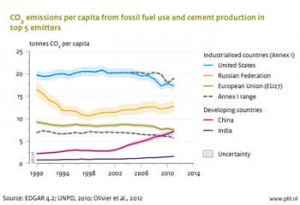Only mass struggle against capitalism and for safe clean alternatives can avert a climate catastrophe
This year’s climate negotiations, “COP 18” (UN Conference of the Parties) took place in Doha, Qatar, from 26 November to 7 December, with representatives from almost 200 governments. The meeting ended in another “compromise” that falls pitifully short of real action. This is despite fresh warnings that the planet is heading for a catastrophic warming of 3-5 degrees celsius this century. The statement called Doha Gateway is chemically free from new, meaningful commitments.
The Doha meeting managed to avoid a total collapse of the global climate circus that has been going on since 1997, by extending the so-called Kyoto protocol by a further eight years until 2020. Kyoto would otherwise have expired this year, and was supposed to be replaced by a new, tougher, and broader agreement covering all countries – but no such agreement is in sight.
But the extended Kyoto Protocol, which covers just 15 percent of global emissions – and now Canada, Japan, Russia and New Zealand have pulled out (the US has never participated) – involves no new emission reduction commitments. The result, which means a new lost decade as far as the climate threat is concerned, drew scathing criticism from environmentalists and experts around the world. Greenpeace called it “a magnificent failure.”
|
CLIMATE FACTS
|
That a total collapse was averted in Doha is because the so-called developing countries eventually signed the statement even though no new money was allocated by the rich countries to the poor countries’ to cover the increasing costs of storms and climate disasters.
None of this is enough to prevent emissions of greenhouse gases that cause climate change from growing year by year. Although an increasing number of weather disasters and a new more alarming report by the UN climate panel IPCC could push the US, China and other governments to an agreement for the period after 2020, this is far too late, while the market “solutions” (so-called carbon trading etc) put forward by the UN system are both absurd and ineffective.
As Bolivia’s negotiators stated in Doha: “A wasteful, consumerist, exclusionary, greedy civilisation generating wealth in some hands and poverty everywhere, has produced pollution and climate crisis. We did not come here to negotiate climate. We did not come here to turn the climate into a business, or to protect businesses of them who want to continue aggravating the climate crisis, destroying Mother Earth.”
Capitalism is incapable of finding solutions to this problem. It requires a new, powerful and global anti-capitalist movement based on climate awareness, which is able to connect with the growing struggle against the same economic system that is also destroying social welfare and jobs in Europe and throughout the world.
More than anything else the climate threat means a race against time to convince the world’s workers and poor people of the necessity of a socialist transition program that combines the need for jobs and welfare with concrete demands for a democratically planned, sustainable and energy-efficient conversion of energy and transportation sectors, housing, industries, fisheries, forestry and agriculture. It goes without saying that a rapid conversion requires that banks and strategic corporations are taken over in public hands and jointly planned, under the control of the working class.




